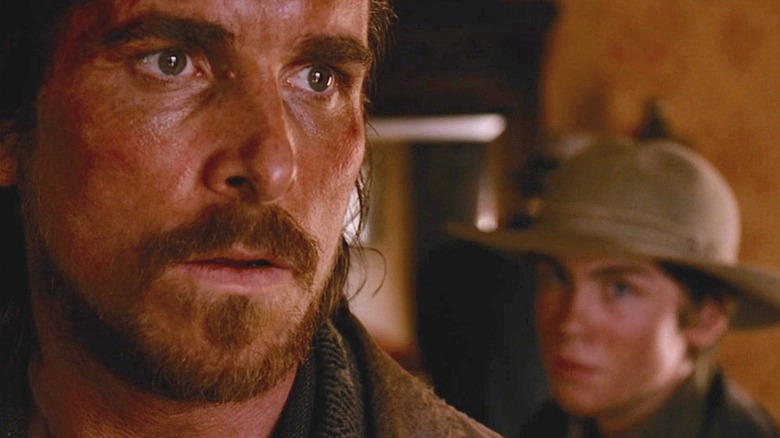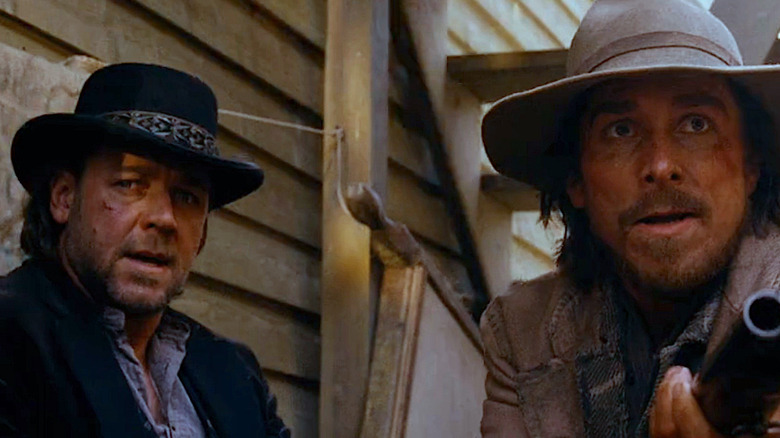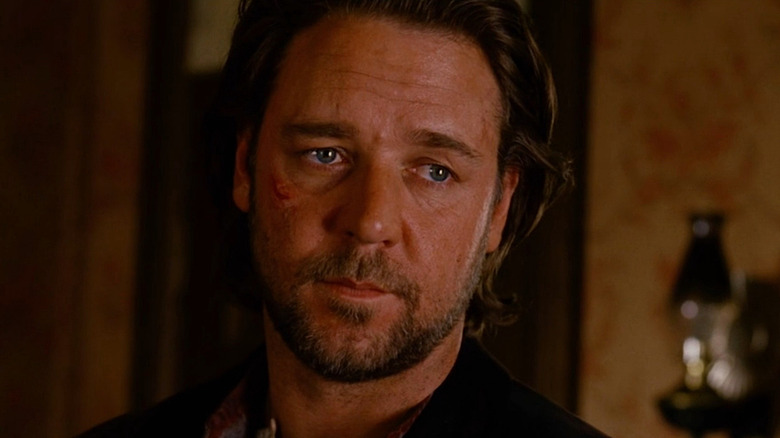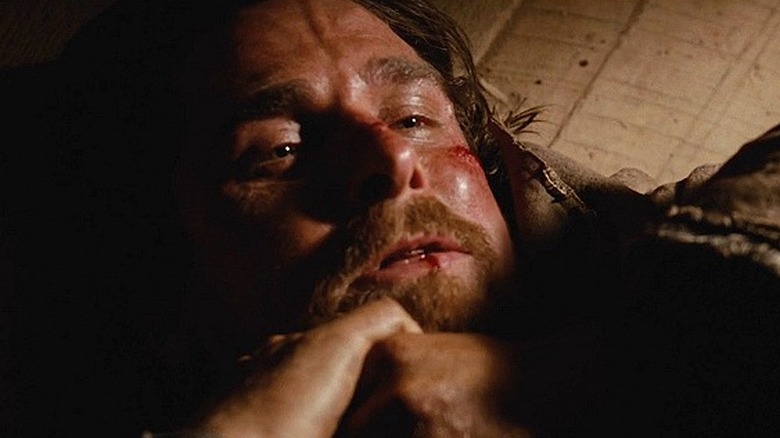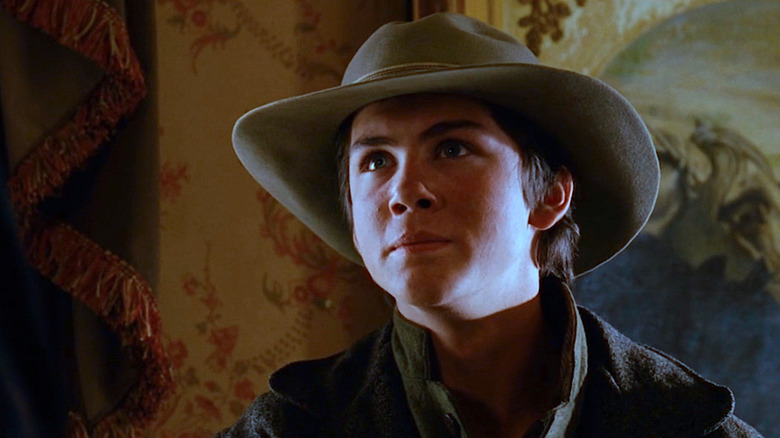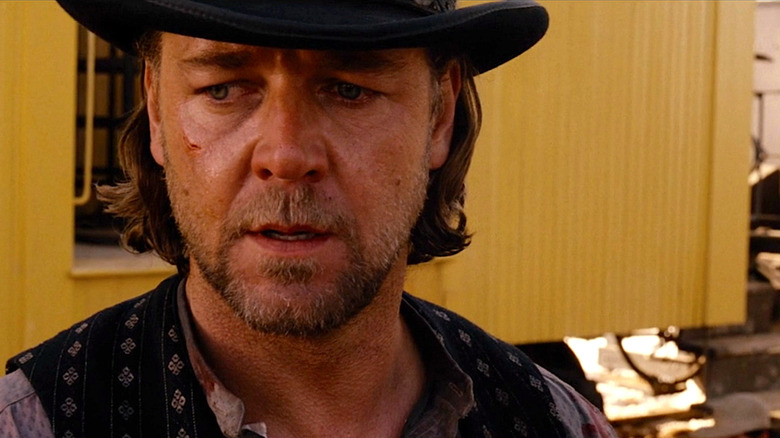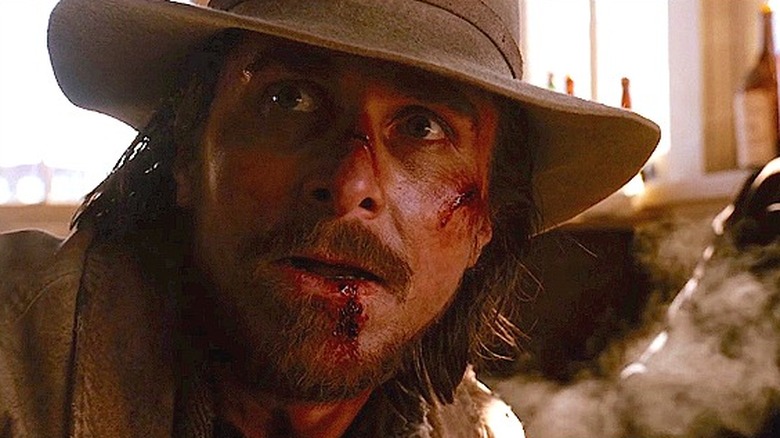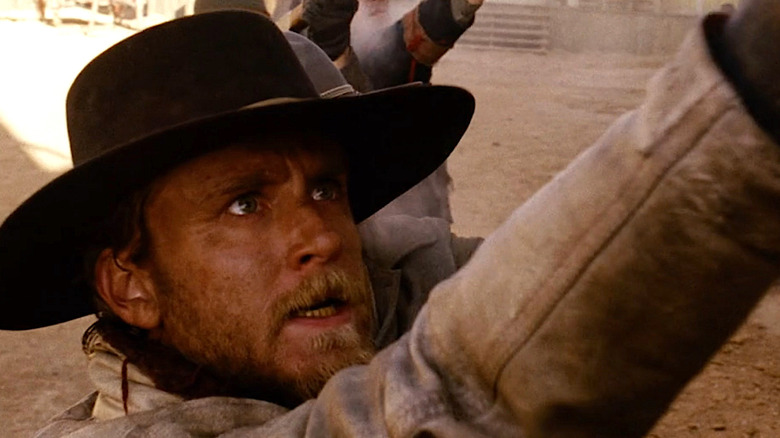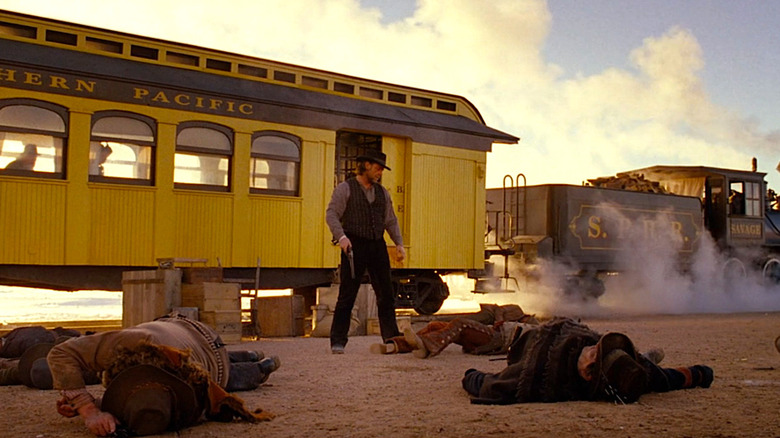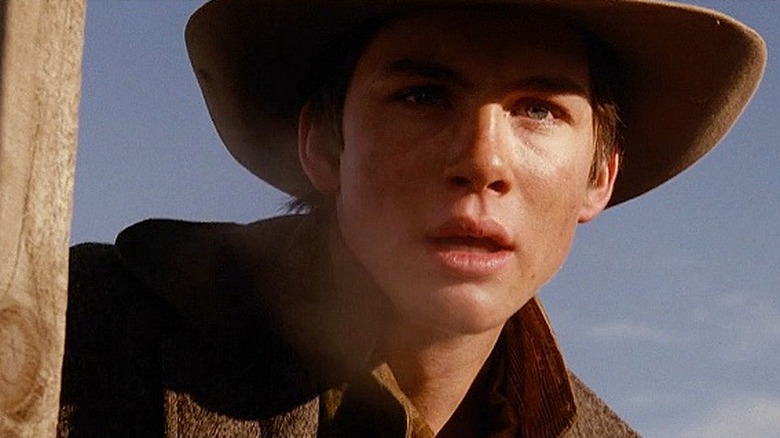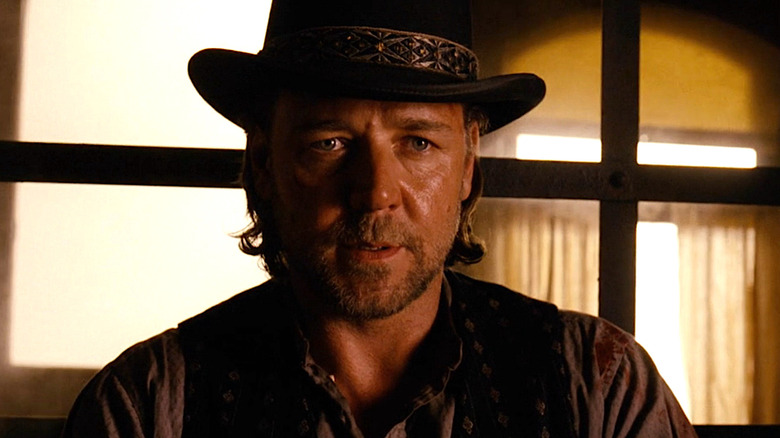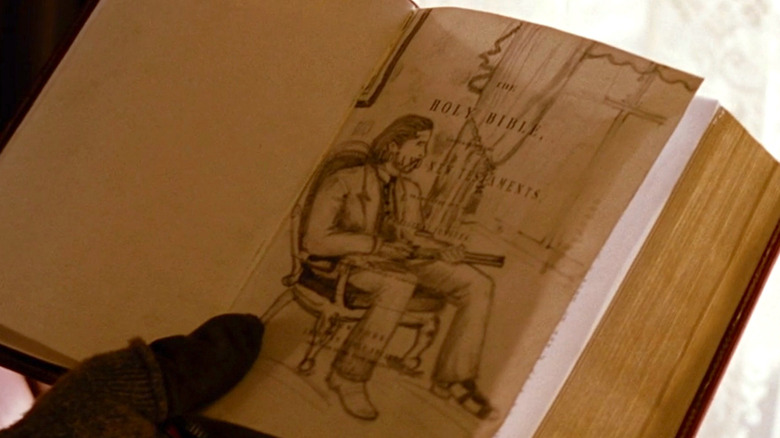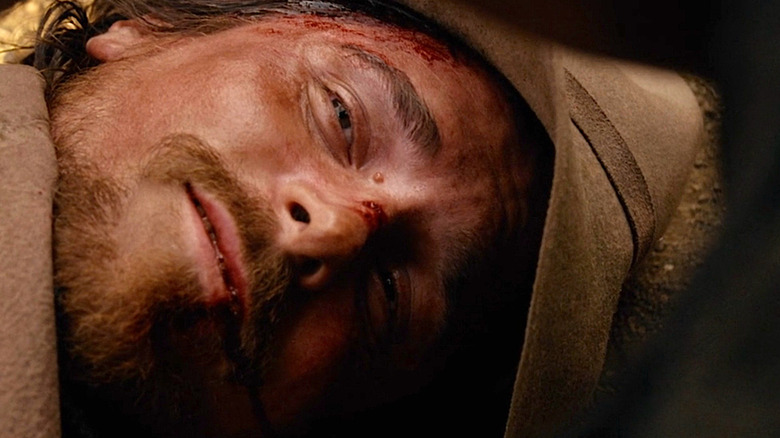The Ending Of 3:10 To Yuma Explained
"3:10 to Yuma," the 2007 remake of 1957's Western based on an Elmore Leonard short story, is as dramatic as it is dusty, meaningful as it is bloody, and as classic as any modern mythical tale set in the wild, wild West can be.
The film stars Christian Bale as a down-on-his-luck rancher and Russell Crowe as the no-good outlaw said rancher pledges to get on the 3:10 train to Yuma Territorial Prison. If the rancher carries off the seemingly impossible task, he'll be rewarded with serious coin and an even more valuable prize, the respect of his own son.
The odds and the outlaw seem stacked against the rancher, but in an explosive third-act twist of fate and heartstrings, the outlaw helps the rancher win the day — even if the rancher loses his life in the process. The shift in attitudes and climactic events happen quickly, kicking up more dust than a runaway herd of cattle at a gunfight. So kick up your cowboy boots, let the dust settle, and keep an ear out for the next train whistle as we explain the ending to "3:10 to Yuma."
What you need to remember about the plot of 3:10 to Yuma
Dan Evans (Christian Bale), an injured Civil War vet with debt for days, can't catch a break. Dan's son William thinks he's a cowardly loser; his other son Mark is sick; and Dan and his wife Alice are struggling to keep their farm running despite an evil, rich landlord who sets fire to it in an attempt to drive them off so the land can be sold to the incoming railroad.
Then, Dan and his boys witness notorious outlaw Ben Wade (Russell Crowe) and his gang shoot up a stagecoach full of Pinkertons and railroad payroll. Wade spares Dan and his sons, which is both a mercy and the latest in a long list of humiliations for the rancher. Later, Dan is hired by Butterfield, a railroad representative, to be a member of the posse that brings Wade to his appointed prison train — the "3:10 to Yuma."
The two men become rivals on the fateful journey. Wade is a supposedly heartless, remorseless killer, and Dan appears to be a weak, failed rancher, husband, and father. But there's more to both men than meets the eye, and they're eventually able to see those depths within each other. This movie is more buddy film than morality tale, though a sense of self and a sort of code of honor have a lot to do with how things go down in the end.
What you need to remember about Ben Wade
Ben Wade is bad to the bone; everyone says so, even the man himself. Still, Wade has at least a shred of a heart stuffed somewhere deep inside his bad guy black vest, and it's not entirely rotten. Wade is more than a little amused by the tall tales others spin about his evil ways, but he never seems to buy into his own hype. Wade keeps to his own moral code, which, as revealed in the ending, might have more than a little to do with his mother leaving him with nothing but a bible and a lie back when he was a kid.
While the man is a quick-draw killer, he might also be a bit of a softie, and a lonely one at that. Wade's pent-up impatience with the stupidity and greed of his part-traitorous, part-obsessive gang acts as a dividing line between him and the rest of his world. But when Wade meets Dan, there's a sense the villain has met a man he can actually have a conversation with, not just give orders to.
Wade also regularly sketches that which he finds beautiful — a bird on a branch, a barmaid he spends quality time with, and even Dan Evans in the Contention hotel room, right before Dan sets off to deliver Wade to the train. This indicates Wade's more contemplative side, something his number one fan, Charlie Prince (Ben Foster), does not prefer to Wade's killer instincts. When Charlie scares away the bird as Wade is drawing it, it foreshadows how Charlie will later destroy something beautiful between Wade and Dan at the end of "3:10 to Yuma."
What you need to remember about Dan Evans
Dan Evans is a desperate and stubborn man, but the "3:10 to Yuma" ending shows he's only driven to extreme lengths by a desire to keep his family safe, and to earn the respect of his son for the first time in his life. Of course, this hard-won pride comes at the cost of Dan's own life, so — sorry, Dan.
While Westerns typically cast their protagonists as noble-hearted, law-abiding, white-hat heroes, Dan doesn't spend much of the movie operating with full good guy confidence. That only develops by the movie's end, after Dan builds up a relationship with bad guy Wade. While Dan's deeply wounded pride, wallet, and sense of self have gotten him into the situation of being Wade's hapless guardian, being the villain's unlikely friend ultimately helps get Dan out of the doldrums.
With Wade, Dan has to act sharp, especially when it comes to warning his son William about Wade's intoxicating charisma. Of course, that charisma — and the odd code of ethics underneath it — draws out more of the same in Dan. Meeting, outsmarting, and then partnering with Wade brings Dan out of the stagnant energy his hard luck life has stuck him in. In the end, it makes him a hero to his son — at least until Dan draws his last breath a moment later.
What you need to remember about William
William Evans (Logan Lerman) hasn't had the easiest life. When he was a small child, his dad, Dan, was away at war, eventually returning with a disability and a mountain of debt he can never repay. While Dan is honest and generally good, he also knows when he's beat — which is pretty much constantly. As such, William's father tries not to rock any boats. Dan doesn't make a run on outlaws to save a stagecoach full of cash, Dan doesn't fight back against the railroad, and Dan doesn't show his rich landlord who's boss, even when said landlord burns down Dan's barn. William's dad knows who's boss, and sadly — it's not him.
William is disgusted by his father's seeming inaction, and enamored of bad boy Wade. Wade is everything Dan isn't: confident, dashing, selfish, and deadly. Wade doesn't worry about consequences because Wade is consequences. Of course, William respects Wade and his outlaw posse more than his father. Until, of course, the end of "3:10 to Yuma" shows William just what that posse — and his dad — are really made of.
Whether William is looking at the jewelry Dan pledged him to return, the drawing Wade created of his father in the hotel bible, or simply his dad running through the streets of Contention with Wade by his side, William sees his father with fresh eyes by the movie's end.
What happens at the end of 3:10 to Yuma
After Dan, William, Butterfield, and the rest of Wade's escort arrive in Contention, the posse starts dropping like flies. Those who haven't already been killed by Wade resign, scared off by Charlie Prince's promise of $200 to anyone who murders one of Wade's captors. Butterfield calls off the escort, promising to pay Dan anyway. There's no winning against Charlie and Wade's new, town-wide gang.
But for Dan, there's more at stake than just money. He vows to deliver Wade to the train, so long as Butterfield pays him (or his wife) $1,000 for his trouble and escorts his son home safely. Wade, who sees William's eyes light up with respect for his father, plays along as Butterfield agrees to Dan's terms. When the fray cuts too close, Wade attacks Dan. But when Dan admits he didn't lose his foot in battle, just friendly fire, Wade sees how much he needs the win, and reveals he's already escaped from Yuma twice before.
Wade and Dan act as partners in their quest to get to the train station. Dan gets him on the train, but then Charlie Prince shoots Dan dead. Enraged, maybe heartbroken, Wade kills his entire posse — including Charlie Prince. William draws on Wade, who seems ready to accept his fate, but William can't do it. He attends to his dead father instead, telling him he achieved his goals. Wade then jumps on the train and takes a seat. He whistles for his horse, and the train (and horse) leave the station.
Why do Dan and Wade work together in the end?
In another life, Dan and Wade might be actual friends instead of two men trading roles of captor and captive. Their partnership comes to fruition in the final scenes, when Wade sees how Dan's "delivery" of him to the train will finally win Dan's son over — not to mention help Dan and his wife keep their farm. Wade's sketch of Dan in the hotel bible is further proof he has a deeper interest in and respect for Dan than he does for his posse.
But when Dan admits he's truly never been a hero, right at the moment Wade could kill him, Wade stops playing at partnership and agrees to work with Dan for real. Besides, he's escaped from Yuma twice before — a fact that makes them both crack up. It's clear Wade will escape again, Dan will win riches and some glory, and both will get to be a little bit of a good guy, for once. Plus, they get to be a team of equals for a little while.
The end of the movie shows the men communicating not with words, but with the all-powerful Western power-duo classic half-smile and meaningful nod. The pair are a posse of two, exuding Butch and Sundance vibes as they jump across rooftops, tumble off of buildings, and tag team a town full of enemies in pursuit of their shared goal: catching the 3:10 to Yuma — which is running more like a 3:15.
Why does Charlie Prince shoot Dan?
Why does Charlie Prince shoot Dan? Maybe a better question is, why doesn't Ben Wade dance with the one who brought him, so to speak? Charlie was Wade's right-hand man long before Dan was a glimmer on the horizon of a stagecoach robbery gone awry. Charlie Prince is devoted to Wade. He's dedicated to saving Wade. He's obsessed with taking down Wade's enemies — but Wade never once sketched Charlie Prince.
On a surface level, Charlie Prince shot Dan Evans because Dan put Ben Wade on the 3:10 to Yuma. Deeper down, Charlie shot Dan because Charlie was jealous of how close he had gotten with Wade. Charlie has an intensity of feeling for Wade, a reverence that's at once energizing and terrifying. Which is hard luck for Charlie, because Wade doesn't seem to notice — and if he does, he doesn't care.
The look on Charlie's face when he shoots Dan is one of relief. But the look on his face when his own personal hero kills him? Ouch. It's got "Et tu, Brute?" written all over it. It's a look of pure shock and awe that beloved bad guy Ben Wade could betray his bad boy bestie after all Charlie Prince has done for him. Sorry, Charlie.
Why does Wade turn on his posse?
The Colt single action Army revolver Wade carries is known as "The Hand of God." The grip is emblazoned with a custom gold cross and comes complete with a curse: anyone who touches the gun, aside from Wade, dies. An appropriate legend for a legendary bad guy's gun, and one that holds true at the end of "3:10 to Yuma."
Of course, Wade doesn't just kill Charlie Prince and the rest of his posse because they touched his favorite weapon. He takes them down because they took down Dan. The symbolism of the moment is at least two layers deep. First, the sight of the gold cross comes moments after Wade told Dan the story about his mother leaving him with nothing but a bible in the train station, and how he read it one time, cover to cover, implying that he once got a dose of "goodness" according to Western logic.
Second, Wade, for all his outlawin', does adheres to a code. We saw this in the beginning when he kills a foolish gang member for "endangering the crew." Wade has to kill his old gang, because they endangered his true crew, the one forged between him and Dan.
Why doesn't William kill Wade?
By the end of "3:10 to Yuma," William has seen the truth of his father for the first time. He's seen his selflessness, stubbornness, and desperation to make a better life for William, his brother, and his mother come to fruition — we hope. After seeing his dad demand a fair price for his services, protection for his family, fight a bunch of bad guys, jump off of rooftops, and get Ben Wade on the right train, our fingers are crossed that Butterfield makes good on his promise.
Life is coming at William fast, but to be honest, the kid has always been a bit more hard bitten and trigger happy than his own father. Which makes it all the more surprising when he draws on Ben Wade — but doesn't shoot. It isn't because William lacks the "stones" to take Ben Wade down or doesn't have the heart to do it — the kid actually has too much heart to do it.
By the very end of the movie, William has come to understand his father — his heroic and human sides — as well as understand killing the bad guy who indirectly got his dad killed would achieve nothing. There is also an intense look exchanged by William and Wade that speaks to the sudden grief and loneliness both men have for the loss of Dan Evans — and their regret for not getting more time with him.
Why does Wade get back on the train?
Before Dan and Wade head out for the last bloody bit of their journey to the 3:10 to Yuma, William tells Wade he isn't all bad. Wade insists that, indeed, he is — and outlines a list of reasons he hasn't already killed William and Dan. William, slightly frightened, remains unconvinced, even if Wade is certain he's truly rotten to the core. But after Wade eases up from strangling Dan, it's a little harder for him to make that argument.
It's impossible to declare Wade is all bad once he kills his whole gang for the crime of Charlie Prince killing Dan, then hops on the train so Dan's family still gets the $1,000 reward. Dan's stubbornness and his wish to not appear stubborn are just two things that won Wade over. The true story about Dan being tied to a failing farm ruled over by wicked landlords and a greedy railroad, unable to leave because the Bisbee climate is the only environment his sick son can survive in — well, that also tugged on one of Wade's remaining heartstrings.
Wade gets on that train to do right by Dan — and to privately admit there's still a little bit of good in his bad guy boots. Also, Wade knows he can get away with this. He might not arrive at Yuma Prison on a horse, but he'll surely ride out on one.
What do Dan and Wade get from each other in the end?
Dan and Wade are two lonely men who got to see the full scope of themselves and each other before their adventure's bitter end. Recognizing the softness and strength in one another when no one else could — or would, in such a brutal landscape — means frustrations with themselves and the world around them could be suspended, however briefly, in favor of an unlikely friendship.
That recognition benefits both men, and also helps save Dan's relationship with his son, even after Dan's death. Dan sees beyond the myth of outlaw Ben Wade, and a picture develops that shows Wade as a little bit like Robin Hood, even if he's more like Jesse James overall. Maybe stealing from the railroad isn't so bad considering the railroad steals life and land from everyone powerless to stop it.
Dan sees Wade's fuller story, not just the dime-store novel adaptations of his adventures. The movie isn't a cut-and-dry, good-guys-win morality tale, but it isn't all that cynical, either.
The filmmakers wanted a very different ending from the original film
"3:10 to Yuma" is a redemption story as well as a "classic" Western that spins out some of the hallmarks of the genre to give a new twist on an old yarn. The good guy isn't all good, the bad guy isn't all bad, and the real enemy isn't the wild outlaw or the stubborn rancher but the creeping web of big business and westward expansion. The 2007 version also has a wildly different ending than the 1957 original, and the filmmakers wanted it that way.
The 1957 film ends with Wade helping Dan escape on the train with him, and Dan shooting Charlie Prince dead as they go. But according to the "3:10 to Yuma" DVD commentary (via Film School Rejects) director James Mangold "didn't think that audiences would buy it." Instead, he and longtime collaborator, cinematographer Phedon Papamichael (who teamed with Mangold for the final "Indiana Jones" and "Ford Vs. Ferrari," among others,) created a more bittersweet ending — to say the least.
According to the commentary, Mangold wanted the ending to be "a washing clean of the earth, of both the tragedy that had been Dan Evans' life and finding something redemptive in it and the misguided venture that had been Ben Wade's life." Even a casual viewing of "3:10 to Yuma" can confirm that just like Dan and his hero moment, he got it.
